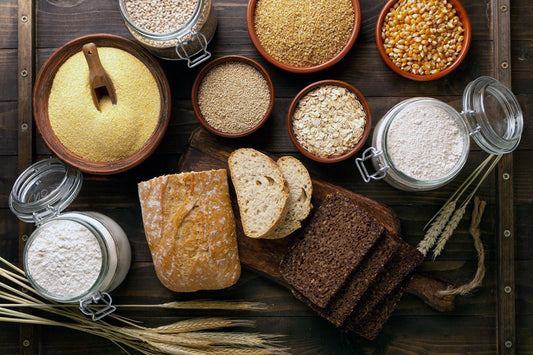For years, we've been told that breakfast is the most important meal of the day. But recently, there has been a growing debate about whether eating breakfast is truly beneficial for weight loss. Some people say that not eating breakfast, you might lose weight because you'll consume fewer calories. But others think that eating a healthy breakfast can make your body burn calories faster and help you lose weight.
In this blog, we will explore and discuss whether it is better to eat or avoid breakfast to lose weight.
Understanding Weight Loss: What You Need to Know
Before getting into the breakfast debate, it's important to understand the basics of weight loss. To lose weight, you must create a calorie deficit by consuming fewer calories than your body burns. This deficit forces your body to utilize stored fat for energy, resulting in weight loss. So, the ultimate goal is to find a sustainable way to reduce your daily calorie intake.
The Role of Breakfast in Weight Management
Breakfast has long been associated with a healthy lifestyle, and numerous studies have examined its impact on weight management. Research suggests that breakfast eaters tend to have lower body weight and are more successful at maintaining weight loss.
One reason behind this association is the belief that a well-balanced morning meal can improve your metabolism. When you eat breakfast, your body receives a signal that it's time to start burning calories and converting food into energy. This metabolic boost can help you burn more calories throughout the day, contributing to weight loss efforts.
Additionally, eating breakfast provides your body with the necessary energy for daily activities. By fueling your body in the morning, you are less likely to experience extreme hunger later in the day. This can prevent overeating and unhealthy snacking since your body already has sufficient nutrients to function optimally.
It's important to note that the quality of your breakfast matters as well. Taking a well-balanced meal that includes protein, fiber, and healthy fats can provide sustained energy and promote feelings of fullness. Studies have shown that eating a high-protein breakfast can help reduce appetite and cravings which can support weight loss efforts.
Pros and Cons of Eating Breakfast for Weight Loss
Let's explore the pros and cons to help you make an informed decision.
Pros:
- Boosts metabolism: Eating breakfast can improve your metabolism, which is the process by which your body burns calories. A higher metabolic rate can help you burn more calories throughout the day, potentially aiding in weight loss.
- Controls appetite: Having a satisfying breakfast can keep you full and curb cravings. When you start the day with a balanced meal, you're less likely to overeat later on. This can be especially helpful in managing portion sizes and making healthier food choices.
- Provides essential nutrients: A nutritious breakfast can provide your body with important vitamins, minerals, and other nutrients. Opting for foods like whole grains, fruits, and proteins provides optimal energy for the day and helps keep you healthy.
Cons:
- Calorie control: Eating breakfast adds to your daily calorie intake. Eating too much or choosing unhealthy foods can make it difficult to lose weight. It is important to consider your daily calorie intake and ensure that your breakfast contributes to your overall calorie goals.
- Individual differences: Each person is unique, and what works for one may not work for another. Certain people feel better when they are not taking breakfast, while others may not. It's essential to listen to your body and find what works best for you.
- Timing and consistency: Consistency in eating breakfast is key. It's okay to skip breakfast once in a while, but skipping it regularly can lead to overeating later. If you choose to eat breakfast, aim for a consistent routine to establish healthy eating habits.
Skipping Breakfast: Does it Help with Weight Loss?
It is not sure that skipping breakfast may reduce overall calorie intake, it does not guarantee automatic weight loss. One randomized controlled study, examined the impact of skipping breakfast on weight gain and loss. Surprisingly, the findings revealed that skipping breakfast did not result in significant weight gain nor did it promote weight loss.
However, it is crucial to acknowledge that individual factors and lifestyle choices can greatly influence weight management. What works for one person may not work for another. The factors like age, metabolism, physical activity levels, and overall dietary patterns play a vital role in it. Additionally, the type of foods consumed during other meals and snacks throughout the day also matters in the overall calorie balance.
Intermittent Fasting: An Alternative Approach
Intermittent fasting has gained popularity as an alternative approach to weight loss due to its potential benefits. It involves dividing your day into periods of eating and fasting, with one common fasting method being to skip breakfast. Taking food at a particular eating window (8–10 hours) in a day allows your body to burn fat for energy. This can help your body use stored fat for energy.
During the fasting period, your insulin levels drop, and your body starts utilizing fat as a fuel source. This can potentially lead to weight loss over time. Intermittent fasting can be effective, but it is important to eat healthy foods during your eating window. When you do eat, focus on consuming nutrient-dense foods that provide essential vitamins, minerals, and macronutrients.
It's also essential to stay hydrated during the fasting period by drinking water, herbal tea, or other non-caloric beverages. Adequate hydration helps control hunger and supports your body's functions.
Healthy Breakfast Options for Weight Loss
If you choose to eat breakfast for weight loss, it's important to make mindful choices. Opt for nutrient-dense, low-calorie options such as:
- Whole grain cereal with fresh fruit and low-fat milk or yogurt
- Oatmeal topped with berries and a sprinkle of nuts
- Scrambled eggs with vegetables and whole-grain toast
- Greek yogurt smoothies made with high-amino acid containing collagen peptide.
Moreover, using wellness supplements such as Keto supplement with your breakfast or meals helps in maintaining a healthy weight. These supplements help your body use fat (ketones) as an energy source, supporting energy production.
Conclusion: Making Informed Choices for a Healthy Lifestyle
In the battle of eating breakfast or skipping it, there is no one-size-fits-all answer. The decision ultimately depends on your individual preferences, lifestyle, and goals. Some people who eat breakfast every day believe it helps with weight loss, while others choose not to eat breakfast. The key is to listen to your body and make informed choices that align with your overall health goals.






